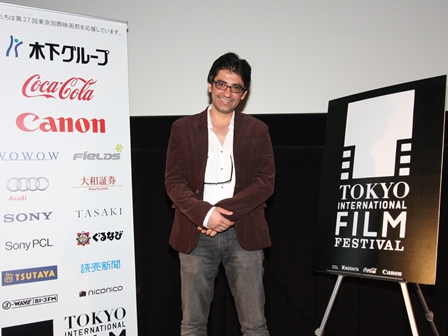FATE DEALS A SETBACK ON DEPARTURE DAY
[Report on Melbourne press conference, Oct. 29]

At a press conference for his TIFF Competition film Melbourne, writer-director Nima Javidi explained the origins of the heartbreaking story: “About five years ago, we stayed with friends in the mountains, and in the morning, I agreed to watch their baby while they went out for a walk. The baby didn’t wake up for a long, long time. I started wondering what would happen if it didn’t wake up at all, so I decided to make a bunch of noise. I felt [such] fear and frustration from that experience, that it led me to writing this story.”
Melbourne is the breathtakingly tense, claustrophobic feature debut of the Iranian director, borrowing some cues from his compatriot Asghar Farhadi, whose award-winning A Separation was also a well-crafted drama of marriage starring Payman Maadi.
“Both of the actors [Maadi and Negar Javaherian] are extremely famous,” said Javidi, explaining that he chose an actress who wasn’t married and wasn’t a mother, to avoid potential problems that might arise from the emotional trauma at the heart of the story. “I asked them to forget about all the direction they’ve received in the past, and not to act, just to be themselves. We shot 70 percent of the film in sequence, and I’d hoped to shoot it all. But we had to stop for a short while due to illness, so the rest was not in sequence.”
It’s understandable that the director would prefer sequential filming, since Melbourne unfolds on a single day, on a single set. The staginess and its excellent screenplay enhance performances that are perfectly modulated, never straying into the hysterics of melodrama despite the emotional rollercoaster ride that engulfs the characters.
Amir (Maadi) and Sara (Javaherian) are a well-to-do young couple headed this very day for a new life in Melbourne, and their happiness is palpable. But after a morning spent scurrying about their spacious, sunny flat completing last-minute chores, fielding constant phone calls and bidding farewell to a stream of visitors, tragedy strikes. As Melbourne moves into the territory of nail-biting thriller, there are upheavals, reversals and a tangled web of lies. The shades of gray darken; the audience must grapple with its own conscience. What should Amir and Sara do about the baby, left by the neighbor’s nanny and no longer breathing? What would we do?
Ratcheting up the excruciating tension with the incessant ringing of phones and the doorbell (Javidi cites Alfred Hitchcock as an influence), the film deals with thorny issues of responsibility and guilt, of wrongheaded decisions and our responses to them, of human nature itself. The reactions of Amir and Sara, who first accuse each other of negligence, then foist blame on the nanny, then rail against Fate itself — “Why did this happen to us?” — are reactions that transcend any border, society or religion. This is a story that could take place anywhere, and it forces the audience to alternately identify with one or the other of its protagonists, and to share complicity with the outcome of their actions.
That outcome, arriving at last with swift suddenness, was the subject of several questions to the director. “When I’m writing films, I don’t think only about the endings,” Javidi responded. “I want to go into the emotions of each scene. I didn’t want to leave major questions for the audience to answer. But it took a long time to find the right [balance]. After three or four months, I came to a decision about my ending, and I feel it leaves the right amount of questions for the audience.”
























